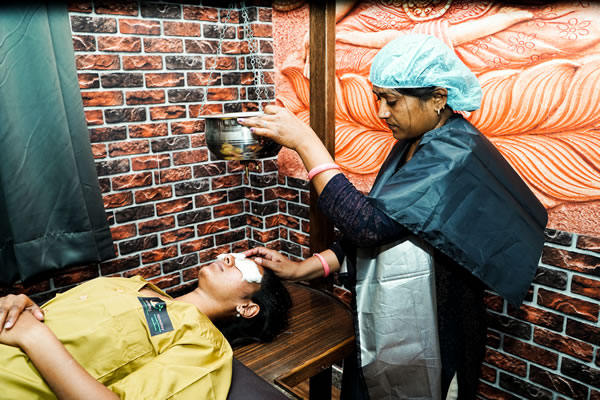Shirodhara
Shirodhara comes from the two Sanskrit words “shiro” (head) and “dhara” (flow). It’s an Ayurvedic healing technique that involves having someone pour liquid — usually oil, milk, buttermilk, or water — onto your forehead. It’s often combined with a body, scalp, or head massage.Ayurveda is a holistic health approach that originated in India thousands of years ago. It focuses on rebalancing the life forces, called doshas, within your body.

Procedure
- If you’re new to shirodhara, it’s best to work with a professional who’s been trained in Ayurvedic practices.
- At the start of the appointment, you’ll be asked to lie on your back and relax.
- Next, the practitioner will heat up the liquid so it roughly matches your body temperature and place it in a bowl. They may hold the bowl over your head or use a stand.
- Either way, the liquid will gently drip through a small hole in the bottom of the bowl, landing between your eyebrows. Your eyes will be covered with a lightweight barrier for protection.
- The whole process generally lasts anywhere from 30 to 90 minutes. It might involve a massage before or after the treatment
Liquid options:
There’s no right or wrong answer when it comes to choosing a liquid, and preferences vary across practitioners. Others might use different liquids for different effects. Sesame oil is widely used because it’s a relatively neutral oil and mixes well with essential oils, which are sometimes used to enhance the experience.
Other oils that might be used include:
- Sesame oil
- Coconut oil
- Ksheerabala oil
- Mahanarayan oil
- Clarified butter (ghee)
Potential benefits
- Shirodhara is said to have relaxing, soothing, and calming effects on the body and mind.
- improve sleep quality
- manage insomnia
- lessen anxietyTrusted Source (when combined with yoga)
- reduce stressTrusted Source
- Keep in mind that most studies looking at the benefits of shirodhara have been pretty small, using only a handful of participants. Still, none of them suggest that the treatment has any negative effects.
